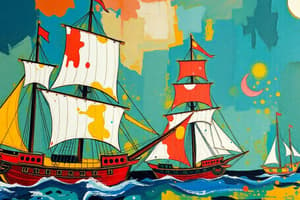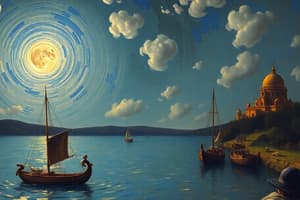Podcast
Questions and Answers
What time period do Oceanic Empires cover in the context of this topic?
What time period do Oceanic Empires cover in the context of this topic?
- 1200 to 1450
- 1450 to 1750 (correct)
- 1600 to 1650
- 1700 to 1800
Which geographic focus is primarily associated with the Oceanic Empires?
Which geographic focus is primarily associated with the Oceanic Empires?
- Mediterranean Sea regions
- Indian Ocean and its trade routes
- Pacific Ocean and island nations (correct)
- Atlantic Ocean and its surrounding territories
Which factor significantly contributed to the expansion of Oceanic Empires during the specified period?
Which factor significantly contributed to the expansion of Oceanic Empires during the specified period?
- Technological advancements in navigation (correct)
- The establishment of military dominance
- The reliance on local alliances
- The discovery of new trade routes
What type of governance was commonly seen in Oceanic Empires during this era?
What type of governance was commonly seen in Oceanic Empires during this era?
Which economic activity was a primary characteristic of Oceanic Empires?
Which economic activity was a primary characteristic of Oceanic Empires?
Flashcards are hidden until you start studying
Study Notes
Oceanic Empires, 1450 to 1750
- European exploration and colonization expanded dramatically during this period.
- European powers, such as Portugal, Spain, France, Britain, and the Netherlands, established empires in the Americas, Africa, and Asia.
- Portugal took control of the Atlantic slave trade.
- Spanish conquistadors conquered the Inca and Aztec empires in the Americas.
- European powers established trading posts and colonies in Asia, particularly in India, Southeast Asia, and China.
- European empires established transatlantic, transpacific, and trans-Indian Ocean trade routes.
- The Columbian Exchange, a global exchange of plants, animals, diseases, and technologies, was a major consequence of European expansion.
- The exchange of goods and ideas between Europe and the Americas led to significant economic, social, and cultural changes.
- European empires exploited the resources and labor of colonized populations.
- This period marked a significant shift in global power, with Europe emerging as a dominant force in the world.
- European empires faced challenges and resistance from indigenous populations.
- European conquest disrupted traditional societies and led to the displacement and enslavement of many people.
- The development of new technologies, such as the printing press and the compass, played a significant role in European expansion.
- Religious motives, such as the desire to spread Christianity, also motivated European exploration.
- Mercantilism, an economic system based on the accumulation of wealth through trade, also influenced European expansion.
The Role of the Atlantic Slave Trade
- The Atlantic slave trade was a major component of the global economy during this period.
- Millions of Africans were forcibly transported to the Americas to work on plantations.
- The slave trade had devastating consequences for Africa, disrupting societies and economies.
- It reinforced the idea of racial hierarchy and fueled the growth of the plantation system in the Americas.
- The transatlantic slave trade had a profound impact on global relations and shaped the development of the Americas.
The Portuguese Empire
- Portugal played a leading role in early European exploration and expansion.
- Their exploration began in the 15th century under Prince Henry the Navigator.
- Portugal established trading posts and colonies in Africa, Asia, and South America.
- Their empire was based on trade, particularly in spices, slaves, and gold.
- Their exploration and voyages laid the foundation for the growth of European empires.
The Spanish Empire
- Spain was another major power in the age of exploration.
- They established colonies in the Americas, including Mexico, Peru, and Cuba.
- They were notorious for their use of forced labor and their exploitation of the indigenous populations’ resources.
- Their empire stretched from the Americas, across the Pacific Ocean to the Philippines, and eastward to the Spice Islands (Indonesia).
- The Spanish Empire’s wealth and power were based on gold and silver mines in the Americas.
The Dutch Empire
- The Dutch were also active in global trade and colonization.
- They established the Dutch East India Company, one of the most successful early multinational corporations.
- The Dutch East India Company established trading posts in Asia, particularly in Indonesia, where they controlled valuable spice trade.
- Their influence in the Indian Ocean and Southeast Asia helped shape the course of global trade during this period.
- They were also involved in the transatlantic slave trade, with colonial holdings in the Americas.
The British Empire
- Britain emerged as a major colonial power during the 17th and 18th centuries.
- They established colonies in North America, the Caribbean, India, and other parts of the world.
- They competed with other European powers for global trade and control of key resources.
- Britain’s colonization created a wide-ranging, multi-cultural empire.
- They became a major player in the Atlantic slave trade and established sugar plantations in the Caribbean.
- Britain’s expansion and colonization had a long-lasting impact on the world.
The Consequences of European Mercantilism
- European mercantilism is a dominant economic doctrine during this period.
- It led to the exploitation of colonial resources and a shift in economic power.
- This system favored the accumulation of wealth through exports and resulted in the development of a global marketplace.
- This created inequalities and conflicts among nations and societies.
Key Developments in Technology
- The development of new technologies played a key role in European expansion.
- These advancements included the compass, the astrolabe, and advances in shipbuilding, such as the caravel.
- Innovations in navigation and cartography allowed for more accurate and efficient sea voyages.
- These technologies facilitated global exploration and trade, allowing for the establishment of new trade routes and empires.
The Exchange of Ideas and Culture
- European expansion also resulted in the exchange of ideas and cultures across the globe.
- The Columbian Exchange facilitated the movement of plants, animals, diseases, and ideas between Europe and the Americas.
- New crops and livestock, like potatoes, corn, and horses, brought about significant changes in agriculture and diet.
- Disease, particularly smallpox, had a devastating impact on indigenous populations.
- Trade and colonization also introduced new ideas and philosophies to different parts of the world.
The Resistance to European Empire
- Indigenous populations resisted European colonization and enslavement in various ways.
- Resistance took many forms, including rebellions, legal challenges, cultural preservation, and religious movements.
- This resistance proved the resilience of indigenous cultures and the power of collective action in challenging imperial power.
- These resistance movements led to a complex and dynamic interaction between European empires and indigenous populations.
Conclusion
- This period represents a period of significant global transformation and disruption.
- The emergence of European empires profoundly impacted the world, shaping global politics, economics, and cultures.
- The consequences of European expansion and the transatlantic slave trade continue to shape the world today.
- The story of oceanic empires is a complex and multifaceted one.
- It’s important to consider the different perspectives of those involved in this period, from those who benefited from expansion to those who suffered its consequences.
Studying That Suits You
Use AI to generate personalized quizzes and flashcards to suit your learning preferences.




